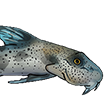Here is the male:

He is exactly 110mm (I measured him before posting) and has the stiff bristle like growths on his pectoral fins, head, forehead and cheeks.
Here is the female:



She is exactly 95mm long (she too had to suffer the indignity of measuring).
Here are a few questions:
1) I have had the male for about 6 months and the female for about 3months. Ever since the female was introduced the boy had turned a deep red brown. Why? Is this maturity?
2) Even though having grown the bristles and changing colour, he has shown no special interest in the female, in the last week I had noticed them hanging around together in the rear left corner of the tank during the day...
3) The female is FAT! Look at her belly in the pics, is she constipated? Or is it roe (eggs)?
Here is what they live in:
A 2ft tank.
Furnishings:
Two pieces of bogwood, one pipe (closed at one end) made out of 2 empty plastic Tetra food bottles. Some stones and a sand bottom which they burrow in from time to time. Also there is some loose pieces of wood on the bottom, small enough for them to push around when they forage. No lights (it is a catfish tank after all...) and no plants.
Filtration:
One powerhead in a 30l (1foot) aquarium stuck to the side of the 2ft tank that acts much like a sump filter. It circulates the entire volume of the tank about 5-6 times an hour, but there is not too much of a current. Filter media is gravel and filter wool and I managed to jury rig a drip filter in this as well working off the same pump.
Tankmates:
Besides the two whips there are:
1 Flounder (nigerian or brazilian sole/tongue not quite certain which it is...)
2 Bristlenoses, a male and female, male whip and male bristlenose generally ignore each other, no squabbles over territory or food.
4 Banjo cats.
6 Pareutropius Buffei (they are meant to go in an African biotope but I had to rescue them from two spawning Daffodils)
1 Otocinclus
3 juvenile daffodils (less than 1cm and meant to serve as live food for the banjo's)
Parameters
NO3: 50-100 mg/l
NO2: 0 mg/l
GH: >6deg<10deg>6deg<10deg
KH: 3deg
PH: 6.4
Temp: 15-25celsius (Lower temp when it has rained here to try and mimic the weather...)
Food:
Bloodworm: Every second to third day, and once in a while I skip for five days.
Mix: (includes bloodworm, mysis, daphnia, Brine shrimp and something else (?)) every other second to third day when I am not feeding bloodworm.
Tetra Tabimin: Bottomfeeder food, every day.
Tetra Plecowafers: Every day.
Shrimp: Once a month
Tetra Bits: Every second day.
Kiwi Fruit: Recently introduced, every third day.
Papaja (pawpaw): Recently introduced, every third day.
There is a huge hole in the top of their tank lid and insects regularly fall in and gets eaten by the inhabitants.
Is anything wrong with my setup? I can't wait for them to spawn, but am not sure if they are happy.
What do you guys think?




